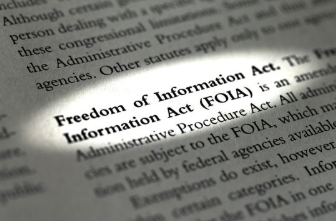Last month, the Illinois General Assembly passed Senate Bill 243, proposing a series of amendments to the Open Meetings Act (OMA), the Freedom of Information Act (FOIA), and the Local Records Act—three (3) laws central to transparency and accountability in Illinois government. If signed by the Governor, the bill will take effect January 1, 2026. Local officials and staff should begin preparing now for the new requirements.
Key Changes At a Glance
- Prohibits public bodies from holding meetings on election days
- Allows remote attendance for members on active military duty
- Requires FOIA transparency postings on public bodies’ websites only
- Expands OMA training options for township officials
- Grants immunity for officials who rely on binding PAC opinions
- Clarifies that junk mail is not a “public record”
- Requires electronic FOIA requests to appear in the body of an email (not as attachments or links)
- Authorizes public bodies to verify that FOIA requesters are persons
- Adds new FOIA exemptions for certain criminal justice and nuclear-security records
No Meetings on Election Days
SB 243 amends the OMA to prohibit public bodies from holding or scheduling regular or special meetings on any election day, including general, consolidated, and primary elections. This rule applies to all units of local government, including home-rule governments, and will require public bodies to review their 2026 meeting calendars to ensure compliance.
Remote Attendance for Active Military Service
SB 243 amends Section 7 of OMA to recognize active military duty as a valid reason for a member to attend a meeting remotely. All other OMA requirements, including the need for a physical quorum at the meeting location, remain unchanged.
Website-Only Posting Requirement
Public bodies will no longer need to post their organizational structure, budget, advisory boards, or FOIA officer contact information at their administrative offices under Section 4 of FOIA. Instead, these materials must be posted on the public body’s website. If a public body does not maintain a website, the physical posting requirement remains in effect.
Expanded OMA Training for Township Officials
SB 243 amends Section 1.05 of OMA to allow township officials to complete required OMA training through a course conducted or sponsored by organizations such as the Metropolitan Township Association or the Township Officials of Illinois. This mirrors existing options for officials in municipalities, park districts, school districts, and other local governments.
Immunity for Reliance on Binding PAC Opinions
The bill clarifies that officers and employees of a public body are immune from liability if they disclose records in accordance with a binding opinion issued by the Public Access Counselor (PAC). This amendment gives FOIA officers and local officials additional assurance that good-faith compliance with PAC rulings will not result in personal or institutional liability.
Junk Mail Not a “Public Record”
SB 243 clarifies that “junk mail” is not a public record under Section 2 of FOIA. Junk mail is defined as unsolicited commercial mail or email sent to a public body and not responded to by an official or employee. This change spares public bodies from processing irrelevant spam while preserving access to legitimate communications.
Electronic FOIA Requests Must Be in the Body of the Email
To enhance cybersecurity, SB 243 requires that electronic FOIA requests appear entirely within the body of the email or submission, not as an attachment or hyperlink. If a public body receives a request with an attachment or link, it must notify the requester within five business days that the request must be resubmitted correctly.
Verification That FOIA Requesters Are Persons
If a public body has a reasonable belief that a FOIA request was not submitted by a person, it may require the requester to verify orally or in writing that they are a person. The response deadline is paused until verification is received. If the requester does not verify within 30 days, the public body may deny the request. Public bodies cannot require private or identifying information as part of this verification.
New FOIA Exemptions
SB 243 adds two new categories of exempt records under Section 7 of the Freedom of Information Act (5 ILCS 140/7):
- Records maintained by criminal justice agencies that share or analyze data about the physical or mental status of individual subjects; and
- Records deemed sensitive by the U.S. Nuclear Regulatory Commission or under the National Materials Program.
Looking Ahead
SB 243 marks one of the most significant transparency-law updates in recent years. The bill would streamline compliance, reduce cybersecurity risks, and clarify long-standing ambiguities under FOIA and OMA. For local governments, the impact will be twofold—greater efficiency and protection in handling records and meetings, but also a need to update policies, calendars, and internal procedures before January 1, 2026.
Airdo Werwas, LLC, will continue to monitor the bill’s progress and any guidance from the Attorney General’s Public Access Counselor. If you have any questions about SB 245 or compliance with FOIA, OMA, or the Local Records Act generally, please contact Mark J. Kimzey at mkimzey@airdowerwas.com or Molly B. Hopkins at mhopkins@airdowerwas.com.


